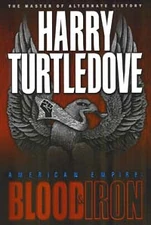| Wilfred Rokeby | |
| Fictional Character | |
| Southern Victory POD: September 10, 1862 | |
| Appearance(s): | American Front through Return Engagement |
| Type of Appearance: | Direct |
| Nationality: | Canada |
| Date of Birth: | 19th century (year unknown) |
| Occupation: | Postmaster |
Wilfred "Wilf" Rokeby was the longtime proprietor of the post office in Rosenfeld, Manitoba, Canada. As might be expected, he was acquainted with the McGregor family during and after the Great War. He shared many of his customers' frustrations with U.S. occupation. In 1917, he shared gossip with Arthur McGregor that U.S. Major Hannebrink, the officer who ordered the execution of McGregor's son Alex, had a mistress on the outskirts of town. After McGregor killed Hannebrink, both men became more circumspect with each other, until McGregor's own death.
At the outbreak of the Second Great War, Rokeby cautioned Mary McGregor Pomeroy against doing anything foolish, reminding her of who her father and brother were and what the U.S. authorities had done with them. He also recalled that she had mailed a package to her "cousin" Laura Secord Moss just before the outbreak of the war and that he read in the papers that one Laura Moss had died in a terrorist bombing.[1]
This frightened Pomeroy but she couldn't decide whether Rokeby was sympathetic to the Canadian cause and giving her good advice or had an ulterior motive. The indecision made her cautious and she temporarily stopped building bombs.
In the mean time Rokeby announced that he planned to retire at the end of 1941. Before he could, however, Pomeroy planted a subversive flyer and cartoon in his store suggesting he was involved in the Canadian resistance movement and anonymously denounced him to Quebecois occupation authorities.[2]
In custody, Rokeby attempted to save himself by informing the authorities all he knew about the bomb Pomeroy mailed to Laura Secord Moss. The authorities investigated, searching the Pomeroy apartment but failing to find any evidence to support Rokeby's claims. In the end, they sentenced Rokeby to 10 years in jail, five for the subversive literature they found at the post office and five more for lying about Pomeroy.
However, Rokeby was vindicated in 1942 when U.S. authorities caught Pomeroy red-handed with explosives in her father's barn.
References[]
- ↑ Return Engagement, pgs. 46-49, hc.
- ↑ Ibid., pgs. 200, 312-317.










